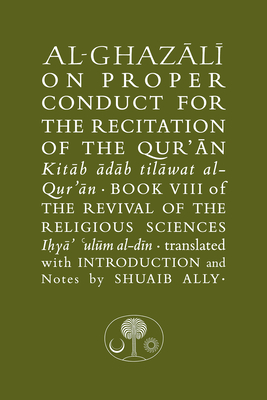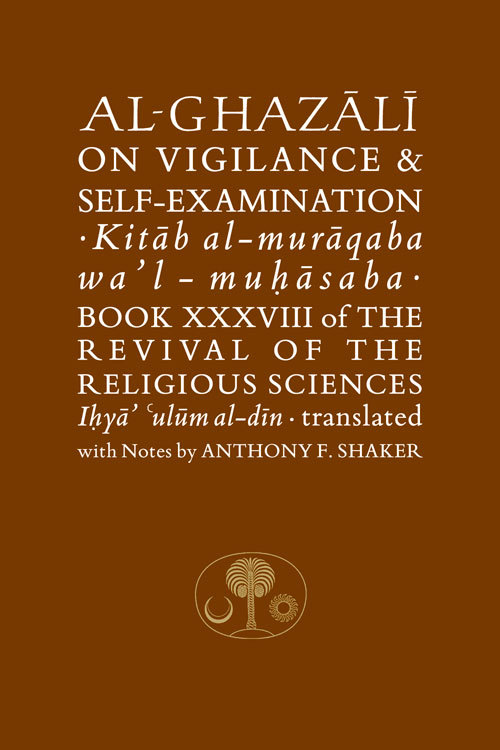


Books in series

The Revival of the Religious Sciences
1100

The Principles of the Creed
2023

The Mysteries of Purification
2023

The Mysteries of the Prayer
2018

Rahsia-rahsia Puasa
2019

Al-Ghazali on Proper Conduct for the Recitation of the Qur'an
2020

Al-Ghazali on Invocations and Supplications
1990

Al-Ghazali on the Manners Relating to Eating
Book XI of the Revival of the Religious Sciences
2000

Al-Ghazali on the Lawful & the Unlawful
2014

Al-Ghazali on Conduct in Travel
2015

Al-Ghazali on Responses Proper to Listening to Music and the Experience of Ecstasy
Book XVIII of the Revival of the Religious Sciences
2019

The Marvels of the Heart
Science of the Spirit
2007

Al-Ghazali on Love, Longing, Intimacy & Contentment
2003

Al-Ghazali on the Condemnation of Pride and Self-Admiration
2018

Al-Ghazali on Patience and Thankfulness
Book XXXII of the Revival of the Religious Sciences
2003

Al-Ghazali on Poverty and Abstinence
2012

Al-Ghazali on Faith in Divine Unity and Trust in Divine Providence
2001

Al-Ghazali on Intention, Sincerity and Truthfulness
2012

Al-Ghazali on Vigilance Self-Examination
2015

Al-Ghazali on the Remembrance of Death and the Afterlife
1989
Author

أبو حامد الغزالي Muslim theologian and philosopher Abu Hamid al-Ghazali of Persia worked to systematize Sufism, Islamic mysticism, and in The Incoherence of the Philosophers (1095) argued the incompatibility of thought of Plato and Aristotle with Islam. Born in 1058, Abū Ḥāmid Muḥammad ibn Muḥammad al-Ghazālī ranked of the most prominent and influential Sunni jurists of his origin. Islamic tradition considers him to be a Mujaddid, a renewer of the faith who, according to the prophetic hadith, appears once every century to restore the faith of the ummah ("the Islamic Community"). His works were so highly acclaimed by his contemporaries that al-Ghazali was awarded the honorific title "Proof of Islam" (Hujjat al-Islam). Al-Ghazali believed that the Islamic spiritual tradition had become moribund and that the spiritual sciences taught by the first generation of Muslims had been forgotten.[24] That resulted in his writing his magnum opus entitled Ihya 'ulum al-din ("The Revival of the Religious Sciences"). Among his other works, the Tahāfut al-Falāsifa ("Incoherence of the Philosophers") is a significant landmark in the history of philosophy, as it advances the critique of Aristotelian science developed later in 14th-century Europe. أبو حامد محمد الغزّالي الطوسي النيسابوري الصوفي الشافعي الأشعري، أحد أعلام عصره وأحد أشهر علماء المسلمين في القرن الخامس الهجري،(450 هـ - 505 هـ / 1058م - 1111م). كان فقيهاً وأصولياً وفيلسوفاً، وكان صوفيّ الطريقةِ، شافعيّ الفقهِ إذ لم يكن للشافعية في آخر عصره مثلَه.، وكان على مذهب الأشاعرة في العقيدة، وقد عُرف كأحد مؤسسي المدرسة الأشعرية في علم الكلام، وأحد أصولها الثلاثة بعد أبي الحسن الأشعري، (وكانوا الباقلاني والجويني والغزّالي) لُقّب الغزالي بألقاب كثيرة في حياته، أشهرها لقب "حجّة الإسلام"، وله أيضاً ألقاب مثل: زين الدين، ومحجّة الدين، والعالم الأوحد، ومفتي الأمّة، وبركة الأنام، وإمام أئمة الدين، وشرف الأئمة. كان له أثرٌ كبيرٌ وبصمةٌ واضحةٌ في عدّة علوم مثل الفلسفة، والفقه الشافعي، وعلم الكلام، والتصوف، والمنطق، وترك عدداَ من الكتب في تلك المجالات.ولد وعاش في طوس، ثم انتقل إلى نيسابور ليلازم أبا المعالي الجويني (الملقّب بإمام الحرمين)، فأخذ عنه معظم العلوم، ولمّا بلغ عمره 34 سنة، رحل إلى بغداد مدرّساً في المدرسة النظامية في عهد الدولة العباسية بطلب من الوزير السلجوقي نظام الملك. في تلك الفترة اشتُهر شهرةً واسعةً، وصار مقصداً لطلاب العلم الشرعي من جميع البلدان، حتى بلغ أنه كان يجلس في مجلسه أكثر من 400 من أفاضل الناس وعلمائهم يستمعون له ويكتبون عنه العلم. وبعد 4 سنوات من التدريس قرر اعتزال الناس والتفرغ للعبادة وتربية نفسه، متأثراً بذلك بالصّوفية وكتبهم، فخرج من بغداد خفيةً في رحلة طويلة بلغت 11 سنة، تنقل خلالها بين دمشق والقدس والخليل ومكة والمدينة المنورة، كتب خلالها كتابه المشهور إحياء علوم الدين كخلاصة لتجربته الروحية، عاد بعدها إلى بلده طوس متخذاً بجوار بيته مدرسةً للفقهاء، وخانقاه (مكان للتعبّد والعزلة) للصوفية.